

Public Journalism and the Problem of Objectivity. The Fading Mystique of an Objective Press. It is worth noting that non-partisan (i.e., objective) reporting coexisted easily in the same penny papers with such pungent sensationalism.
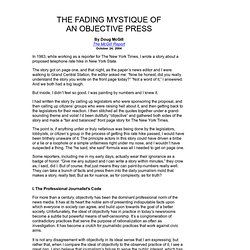
“Neutrality will sleep with anyone,” as the saying goes. Right there at the creation of the modern press, paradoxes abounded. Bennett and other penny publishers touted nonpartisanship, yet on issues that were universally applauded the pennies were rabid advocates. Bennett for example was always super patriotic and always proslavery, both being conducive to pleasing his readers and thus to producing profits. During the 20th century, the ideal of objectivity in news coverage went from strength to strength.
Objectivity (journalism) Journalistic objectivity is a significant principle of journalistic professionalism.
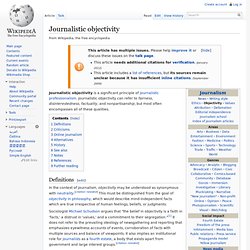
Journalistic objectivity can refer to fairness, disinterestedness, factuality, and nonpartisanship, but most often encompasses all of these qualities. Definitions[edit] UNT talk-Objectivity in Journalism. University of North Texas Nature Writing Symposium talk: “Changing the World One Story at a Time” April 2007 Copyright © 2007 Wendee Holtcamp – bohemian@wendeeholtcamp.com Suppose you are given a bucket of water.
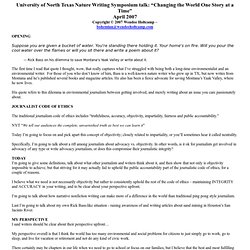
You're standing there holding it. -- Rick Bass on his dilemma to save Montana's Yaak Valley or write about it. The first time I read that quote I thought, wow, that really captures what I’ve struggled with being both a long-time environmentalist and an environmental writer. His quote refers to this dilemma in environmental journalism between getting involved, and merely writing about an issue you care passionately about. Public Journalism and the Problem of Objectivity.htm. Objectivity, Professionalism, and Truth Seeking in Journalism : C.W. Anderson.
Media bias. Media bias is the bias or perceived bias of journalists and news producers within the mass media in the selection of events and stories that are reported and how they are covered.
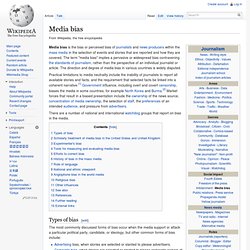
The term "media bias" implies a pervasive or widespread bias contravening the standards of journalism, rather than the perspective of an individual journalist or article. The direction and degree of media bias in various countries is widely disputed. Practical limitations to media neutrality include the inability of journalists to report all available stories and facts, and the requirement that selected facts be linked into a coherent narrative.[1] Government influence, including overt and covert censorship, biases the media in some countries, for example North Korea and Burma.[2] Market forces that result in a biased presentation include the ownership of the news source, concentration of media ownership, the selection of staff, the preferences of an intended audience, and pressure from advertisers.
There Is No Such Thing As ‘Objective’ Journalism — Get Over It. You read that correctly.

There is no such thing as objectivity in journalism. And it’s time to get over it. Every journalist has a political point-of-view and they don’t magically check that at the door the minute they land a job. Many pretend to pursue some noble cause of pure “objectivity,” but it is truly in vain. Every good journalist is informed about what the subjects they cover and it would be near-impossible to be informed and not have an opinion. Aside from outright disclosing a political bent (or as we do here at Mediaite, labeling an article a “column”), there are plenty of ways “objective” journalists can unwittingly reveal their biases. Let’s say a conservative commentator spends a whole minute speaking with passion about some issue. There is also the more indirect form of tipping your hand: selection bias. I’ll start: If you read any of my posts labeled as “columns,” you might already know that I am a libertarian.
Journalism Ethics: Objectivity. In the chapter for last week, Merrill discussed all the ways that journalists can, inadvertently or deliberately, become propagandists -- the opposite of objective observers and reporters.
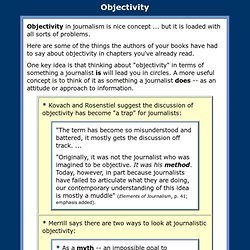
In this week's chapter on general semantics, he says that close attention to the use of language is one way journalists (and everyone else, too) can come as close as humanly possible to truthful communication. General semantics is a way of looking at how people use language and how the words they choose affect human behavior. Probably its best-known idea is that "the map is not the territory. " That is, the word we use to define or describe something is just that -- a word. It is not the thing itself. From that idea, we get a variety of other useful things to remember about words and how we can use them to convey meaning that corresponds as well as possible to reality. What does all this have to do with objectivity? Public Journalism and the Problem of Objectivity.
Why Objectivity Still Matters. The notion that reporters should be objective is taking a beating these days, and the assault couldn’t come at a worse time for the public.
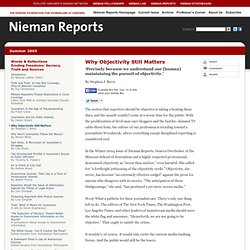
With the proliferation of devil-may-care bloggers and the factsbe- damned TV cable shout fests, the culture of our profession is trending toward a journalistic Woodstock, where everything except disciplined reporting is considered cool. In the Winter 2004 issue of Nieman Reports, Geneva Overholser of the Missouri School of Journalism and a highly respected professional, denounced objectivity as “worse than useless,” even harmful. She called for “a forthright jettisoning of the objectivity credo.” Objectivity, she wrote, has become “an extremely effective cudgel” against the press for anyone who disagrees with its stories. “The anticipation of these bludgeonings,” she said, “has produced a yet more craven media.” Wow! It wouldn’t, of course. What is objectivity in journalism?
Objectivity is expressing or dealing with facts or conditions as perceived without distortion by personal feelings, prejudices or interpretations.
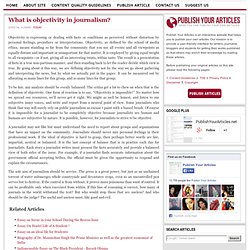
Objectivity, as defined by the school of media ethics, means standing so far from the community that you see all events and all viewpoints as equally distant and important or unimportant for that matter. It is employed by giving equal weight to all viewpoints—or if not, giving all an interesting twists, within taste. The result is a presentation of facts in a true non-partisan manner, and then standing back to let the reader decide which view is true. By going about it this way, we are defining objectivity not by the way we go about gathering and interpreting the news, but by what we actually put in the paper.
It can be measured out by allocating so many lines for this group, and so many lines for that group. To be fair, any analysis should be evenly balanced. The Myth of Objectivity in Journalism. By This page has been accessed since 29 May 1996.
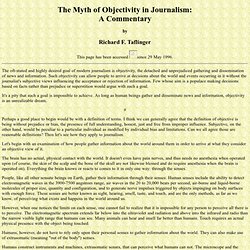
7 Principles of Media Objectivity. Media manipulation is one of the most unfortunate aspects of the Israeli-Palestinian conflict.
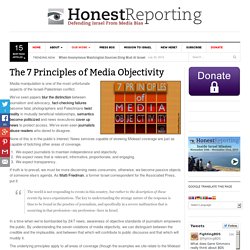
We’ve seen papers blur the distinction between journalism and advocacy, fact-checking failures become fatal, photographers and Palestinians twist reality in mutually beneficial relationships, semantics become politicized and news executives cover up news to protect access. We’ve even seen journalists abuse readers who dared to disagree.
None of this is in the public’s interest. News services capable of skewing Mideast coverage are just as capable of botching other areas of coverage. We expect journalists to maintain independence and objectivity.We expect news that is relevant, informative, proportionate, and engaging.We expect transparency. If truth is to prevail, we must be more discerning news consumers, otherwise, we become passive objects of someone else’s agenda. The world is not responding to events in this country, but rather to the description of these events by news organizations.